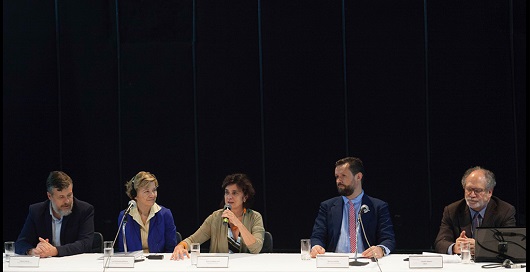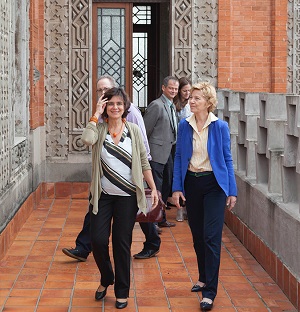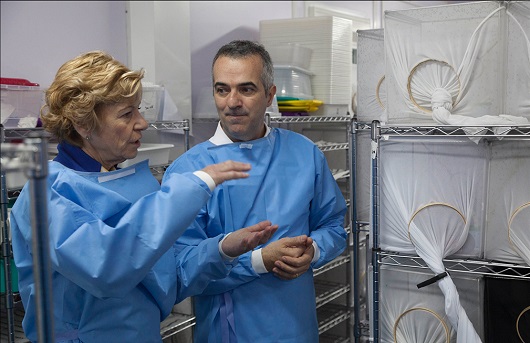Gates announces funding to eliminate malaria
15/08/2018
Julia Dias
“A chance for a radical cure for malaria by combining a new drug in a single dose with a diagnosis that ensures if the treatment is right for the person," was how Sue Desmond-Hellmann, CEO at the Bill and Melinda Gates Foundation, has defined a treatment that can be implemented from tests developed by Instituto Elimina/Elimina Institute, a consortium of about 30 organizations - which include the Ministry of Health, Fiocruz and the National Council for Scientific and Technological Development (CNPq). "It is precision medicine being used for poorer populations," she said.

Photo: Pedro Linger
Sue has been in Brazil for the first time as CEO at the Gates Foundation and visited Fiocruz on June 19th to announce an investment of US$ 600 thousand (about R$ 2.2 million) to speed up efforts to eliminate malaria in Brazil. In addition, Sue and her team participated in meetings and visits to Fiocruz projects already supported by the Foundation.
Tafenoquine is the first new drug in 60 years against malaria caused by P. vivax, a type prevalent in 90% of cases in Brazil, and reduces treatment against relapses for a single day. Currently, treatment lasts from 7 to 14 days. However, both the current and the new treatment pose risks for about 5% of the population, since the lack of G6PD enzyme, a genetic condition, can cause side effects in these patients such as anemia and even death. Therefore, accurate diagnosis of the presence of the enzyme is essential to determine which treatment is appropriate for each patient. This test will now be implemented by Instituto Elimina, improving the current treatment of the disease and facilitating the introduction of the new one.
The single dose plays an important role in elimination efforts. The reduction makes it easier for people to complete treatment, avoiding relapse, one of the causes of perpetuation of the disease cycle in the Amazon. In addition, the incidence of the disease has a history of ups and downs, and a single case incubated is potentially responsible for the resurgence of the epidemic, Marcus Lacerda explains, lead researcher at Instituto Elimina.
This is what is currently happening in the Americas, a resurgence after a decade of decline. The entire region has seen malaria increases in the last year - in Brazil, cases have increased by 50%. The current public health crisis in Venezuela has resulted in a large increase in cases within the country, which creates more concern for the borders of the entire Latin America. According to the latest data from the World Health Organization (WHO), there were 216 million cases of malaria in the world and 445 thousand deaths in 2016.
Lacerda clarifies that the causes of disease return are not entirely clear and can be influenced by many factors. However, the disinvestment and dismantling of programs after disease control are mentioned as factors that contribute to make this return even worse. "So, we need to understand the importance of eliminating malaria," Cássio Peterka said, a representative of the Ministry of Health and the National Anti-Malaria Program.
The researcher also advocates moving from control to elimination as a goal. Although it seems unattainable, he believes that this goal can be achieved in a few years, with efforts and investments to do so. "We have already reduced the malaria map very much," the researcher recalled, demonstrating that in 1950 the disease was endemic in almost the entire national territory and is now concentrated only in the Amazon region. One week before, Paraguay has been declared a malaria-free country by WHO. It is the second country on the continent to achieve this recognition. Cuba has been free of the disease since 1973.
“Brazil is in an excellent position to lead other countries in efforts to eliminate malaria," the Gates Foundation CEO said. "Working in collaboration with the Ministry of Health, Fiocruz and other important partners, our goal is to substantially shorten the time needed to provide new treatments and tests for malaria," she said. The treatment is expected to be approved for use as early as 2019.
Nísia Trindade Lima, president of Fiocruz, also celebrated the partnership between the two institutions, which has been lasting for more than a decade, and highlighted the importance of the Brazilian Health System (SUS) in the fight against malaria and other health problems. "It is important to think of SUS as the main innovation in health, both in the technological and social dimensions," Nísia said. For the president, personalized medicine opens new perspectives of treatment, but also carries the risk of generating new inequalities. Therefore, public health initiatives are important. "When we talk about malaria, it is no longer a neglected disease, but rather a neglected population," Nísia said.
Support for innovation
 Another focus of Sue Hellmann's visit to Fiocruz was the follow-up of projects co-financed by the Foundation. Cooperation between the two institutions has begun in 2008 and included topics such as tuberculosis, vaccines and other public health issues. She also took the opportunity to visit the campus of Manguinhos and the Fiocruz Castle, by which she was enchanted. "I am very impressed with Fiocruz and the history of Oswaldo Cruz. As a scientist, I love science and there is nothing better than a castle to celebrate it," Sue said.
Another focus of Sue Hellmann's visit to Fiocruz was the follow-up of projects co-financed by the Foundation. Cooperation between the two institutions has begun in 2008 and included topics such as tuberculosis, vaccines and other public health issues. She also took the opportunity to visit the campus of Manguinhos and the Fiocruz Castle, by which she was enchanted. "I am very impressed with Fiocruz and the history of Oswaldo Cruz. As a scientist, I love science and there is nothing better than a castle to celebrate it," Sue said.
In the morning, the staff of the Gates Foundation had the opportunity to personally meet Aedes aegypti mosquito breeding site using the Wolbachia method and some results from the World Mosquito Project (WMP) in Brazil. The program is present in 12 countries and is funded by the Gates Foundation.
The method allows the reduction of the incidence of diseases transmitted by Aedes aegypti such as dengue, zika and chikungunya, through the introduction of mosquitoes with Wolbachia bacteria in environments with a high prevalence of mosquitoes. It has been proven that when the bacterium is present, these viruses do not develop well, reducing their transmission. In addition, the method has proven sustainability, since the bacterium is transmitted naturally from the female to its descendants.

Photo: Pedro Linger
In Brazil, the method has achieved a larger scale after a pilot phase due to the need for rapid response to the crises of zika, chikungunya and dengue in Rio de Janeiro and Niterói. In November 2016, a large-scale expansion began for 28 neighborhoods in Niterói, which cover 270 thousand people. Currently, in Niterói, 13 neighborhoods receive the second round of mosquito release. In Rio de Janeiro, a large-scale release began in August 2017, with the expectation of reaching 90 neighborhoods, where 2.5 million people live. At the present stage, 28 neighborhoods of Rio de Janeiro, with 886 thousand inhabitants, receive Aedes aegypti mosquitoes with Wolbachia.
Some projects contemplated by Grand Challenges, co-financed by the Gates Foundation, were also presented. Grand Challenges is a series of initiatives that promote innovation to solve the major global health and development problems. In Brazil, two calls for the challenge were launched in 2013 and 2014 with the theme maternal and child health, and 21 projects were contemplated. In 2018, two new calls have been launched and the projects are under review. link
Selected in the first call in 2013, the project of José Simon, professor and researcher at Ribeirão Preto School of Medicine - University of São Paulo (FMRP-USP) seeks to develop human milk enriched with human milk itself. To this end, a frozen and dehydrated human milk (lyophilized) has been created, which can improve the nutrition of newborns with very low birth weight, that is, babies born with less than 1500g. The project is expected to release its first results soon in Plos magazine. Evidence indicates that the method is safe, inexpensive and easy to implement in the network of milk banks in Brazil. From now on, the research should begin its phase of clinical trials.
Another project presented was the cohort of 100 million Brazilians from the Center for Data Integration and Knowledge for Health (Cidacs/Fiocruz). The research works with large databases such as Cadastro Único - a Single Registry for social programs - to analyze how public policies such as Bolsa Família can interfere with health variables such as infant mortality. The importance of this project is that it provides a much larger scale for research, and makes possible cuts in subpopulations and multiple interactions.
Cidacs/Fiocruz participated in a call from Grand Challenges Brazil as a data provider, making available the Cohort of 100M Sinasc [live births]-SIM [mortality]. In addition, it is an example of good data protection practices for health research in the country and may become a reference after the approval of a personal data legislation. In July, Brazil approved its first law to regulate this theme. "Fiocruz has the possibility of taking on this role of guardian and curator of a health data heritage", Maurício Barreto explained, researcher of the project.


